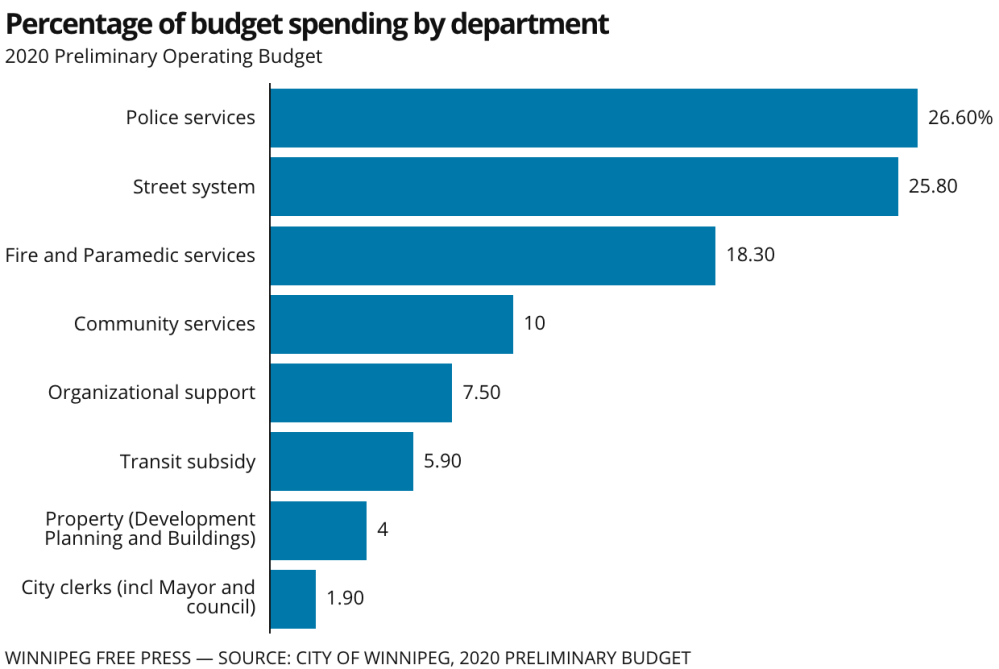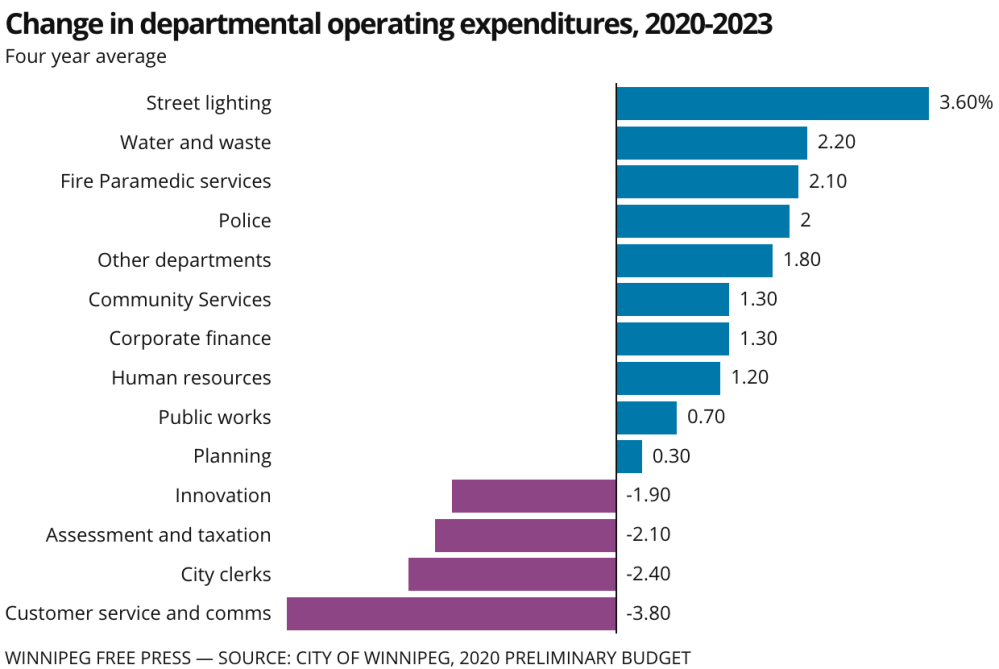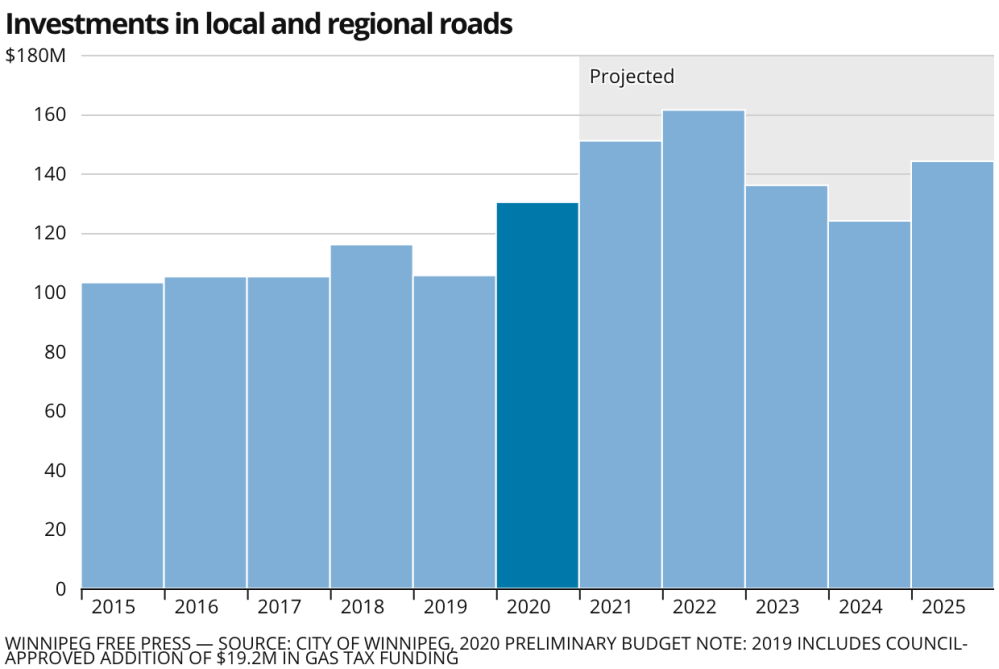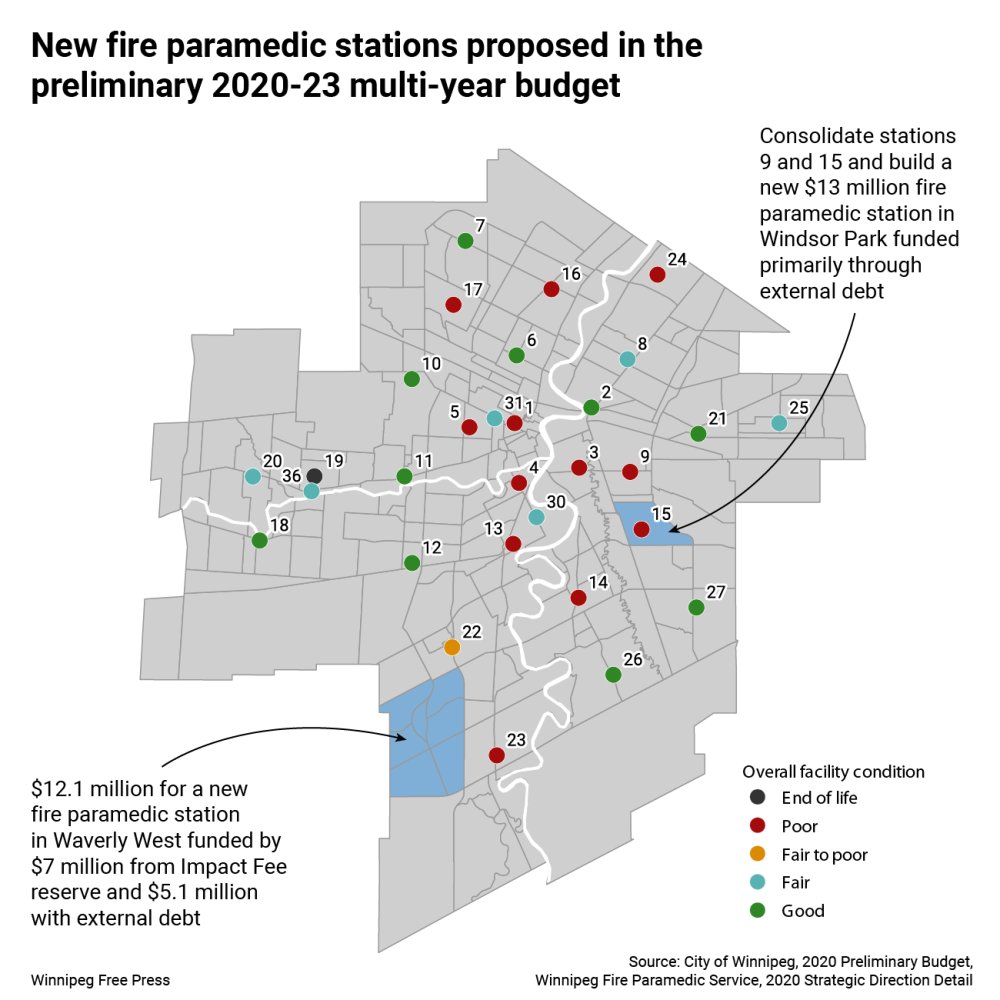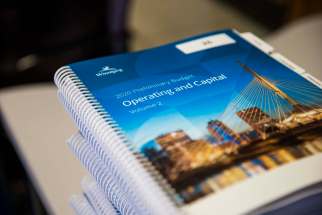Feared cuts to facilities, services not in proposed four-year civic budget
Read this article for free:
or
Already have an account? Log in here »
To continue reading, please subscribe:
Monthly Digital Subscription
$0 for the first 4 weeks*
- Enjoy unlimited reading on winnipegfreepress.com
- Read the E-Edition, our digital replica newspaper
- Access News Break, our award-winning app
- Play interactive puzzles
*No charge for 4 weeks then price increases to the regular rate of $19.00 plus GST every four weeks. Offer available to new and qualified returning subscribers only. Cancel any time.
Monthly Digital Subscription
$4.75/week*
- Enjoy unlimited reading on winnipegfreepress.com
- Read the E-Edition, our digital replica newspaper
- Access News Break, our award-winning app
- Play interactive puzzles
*Billed as $19 plus GST every four weeks. Cancel any time.
To continue reading, please subscribe:
Add Free Press access to your Brandon Sun subscription for only an additional
$1 for the first 4 weeks*
*Your next subscription payment will increase by $1.00 and you will be charged $16.99 plus GST for four weeks. After four weeks, your payment will increase to $23.99 plus GST every four weeks.
Read unlimited articles for free today:
or
Already have an account? Log in here »
Hey there, time traveller!
This article was published 06/03/2020 (2104 days ago), so information in it may no longer be current.
Winnipeg’s 2020-23 draft budget includes far fewer civic facility closures than some critics have feared, but the proposed cuts that remain are sparking backlash.
Under the city’s four-year preliminary operating budget, all pools, arenas and libraries that are currently open will remain open — if the spending blueprint is finalized, as is.
Mayor Brian Bowman said the decision comes in response to community rallies against proposals that could have resulted in the closure of up to five pools, five arenas, and three libraries.
“Our priority in this budget process was to keep the lights on at libraries and pools and rec facilities,” he said Friday.
Department proposals to discontinue multi-family garbage collection and reduce streetlighting were also ruled out. The fate of Terry Sawchuk Arena, which has been temporarily closed due to mould issues, is still to be determined.
Other cuts are still in the mix, including leisure guide programming by 50 per cent (excluding swimming). It would also cut most annual grants by 10 per cent in 2020, excluding those that have multi-year funding agreements or support groups who provide a service for the City of Winnipeg.
Winnipeg’s 2020-23 preliminary budget also proposes to:
— Reduce the number of full-time equivalent staff positions to 9,091 (from 9,129);
— Spend $1.3 million to remove a rule that requires Transit Plus rides to begin and end within 500 metres of an established bus route;
— Invest $2.5 million to improve Transit Plus;
— Reduce the number of full-time equivalent staff positions to 9,091 (from 9,129);
— Spend $1.3 million to remove a rule that requires Transit Plus rides to begin and end within 500 metres of an established bus route;
— Invest $2.5 million to improve Transit Plus;
— Build a new fire paramedic station in Waverley West, funded by $7 million of impact fees and $5.1 million of external debt;
— Construct a new fire paramedic station in Windsor Park and close one on Marion Street, consolidating services;
— Increase the urban forest enhancement budget by $10 million by 2023;
— Add $1 million for 24-hour safe spaces;
— Increase the police budget by two per cent per year, to reach $313.1 million in 2023, while avoiding proposals to cut 34 police and 25 cadet positions, as the city would reinvest savings from police pension changes;
— Introduce no new fees, while holding the water and sewer dividend rate and frontage levy steady. Most fees would increase by the rate of inflation;
— Reduce the business tax levy to 4.84 per cent;
— Make no changes to parking metre rates.
Coun. Scott Gillingham (St. James), finance committee chairman, said the grant cuts may be tough to accept, but will provide long-term funding certainty.
“We are giving assurance to those organizations to say, ‘Yes, there’s a reduction of 10 per cent, but now, for the next four years, you know what your funding level is,’” he said.
The preliminary budget includes plans to remove Sunday hours for the six libraries that offer them (including Millennium Library); it would also cut hours so no library branch is open past 8 p.m.
The mayor said the budget reduces spending, which forced some difficult decisions.
“What we have accepted in this preliminary, multi-year budget is $118 million of expenditure reductions. Those are 118 million reasons why many groups are not going to like some of what’s being proposed here,” said Bowman.
A citizens group that rallied against budget cuts quickly lashed out the plan.
“Everything that we’re doing around libraries is draconian and unnecessary,” said Joe Curnow, a spokesman for Budget for All.
Meanwhile, the mayor defended the early, public budget process, which many have criticized as stoking fears about steep cuts council wouldn’t actually approve.
“While I know it may have been difficult, and in some cases even shocking, to see some of the options provided by the public service to balance the budgets, these were the types of options that in previous years would have been made by the public service behind closed doors,” said Bowman.
While special attention was paid to recreation, some city buildings could be sold. The 2020-23 budget proposes to review city-owned properties and sell those deemed surplus, then use the funds to support reinvestment in wading pools and splash pads. The plan also calls to “rationalize” the number of wading pools.
The budget also proposes to repurpose up to 30 per cent of city-owned golf properties, including the sale of John Blumberg Golf Course.
As the mayor previously promised, property tax will continue to increase by 2.33 per cent per year, with two per cent devoted to roads and 0.33 per cent dedicated to the Southwest Rapid Transitway.
The 2020 portion of the budget includes $1.14 billion of expenses, with spending slated to rise by an average of 1.5 per cent annually through 2023.
The plan says $130 million will be spent to improve local and regional roads in 2020, followed by $151 million in 2021, $161 million in 2022, and $136 million in 2023.
Chris Lorenc, president of the Manitoba Heavy Construction Association, said he was pleased by the focus on infrastructure.
“I think we’re better off than where I anticipated we might be heading into the budget. So, kudos to them for having stuck to some discipline to the purpose behind investment in infrastructure,” he said.
The 2020-23 operating budget could still change before council casts its final vote on the financial blueprint March 25.
Joyanne.pursaga@freepress.mb.ca
Twitter: @joyanne_pursaga

Born and raised in Winnipeg, Joyanne loves to tell the stories of this city, especially when politics is involved. Joyanne became the city hall reporter for the Winnipeg Free Press in early 2020.
Our newsroom depends on a growing audience of readers to power our journalism. If you are not a paid reader, please consider becoming a subscriber.
Our newsroom depends on its audience of readers to power our journalism. Thank you for your support.

